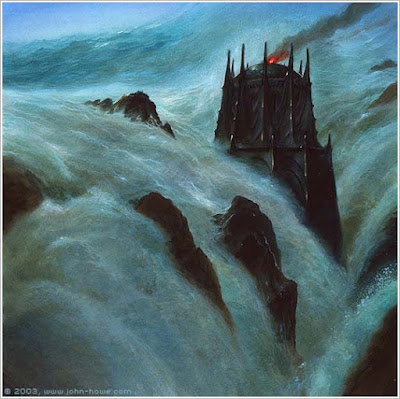 |
| The Temple of Melkor by Elena Kukanova |
So, if you haven't heard the news, Amazon's Lord of the Rings series released a casting call for extras comfortable with nudity. Now, for all I know, this could be any type of nudity. It could be a flashback of the creation of elves, tasteful and Edenic. It could be a war scene where Mordor punishes a village by making them strip and run through the snow. A dwarf could have his armor catch fire and...I don't know, need to take it off to in order to put it out or something. There are many reasons nudity might appear in a show don't require pearl clutching. Lots of reasons, that is, if I were an idiot.
When Time Magazine hailed George R.R. Martin as “An American Tolkien” I realized that mass media just doesn't get Lord of the Rings. I became outright concerned by this lack of comprehension when Amazon bought the rights to produce a series set in the Second Age of Middle Earth. When Christopher Tolkien died and Tom Shippey parted ways with the creative team, I knew we were in for some big trouble. “Guys,” I said to some like-minded Catholics at the time, “I worry we are going to get a Galadriel sex-scene.” With this casting call, I'm damn near certain of it. In fact, I guarantee you that we are going to get a three-way with two hobbits and an orc, just so the reviewers have something to tweet about whenever that episode (I'm guessing season three) drops.
Now, those of you who knew me in my twenties will say that I am glass house territory. Those of you who know me now may say I am in danger of prudishness. Consider both these dangers acknowledged, but also consider that I have an aesthetic argument as well as a moral one. I believe that a titillating Lord of the Rings does disservice to what makes Lord of the Rings the Lord of the Rings. It violates the work's inscape, as it were.
Observe: Michelangelo's Pietà is not placed on top of chocolate fountain during a cocktail party; it is in a church. Diamonds are not tossed into drawer; they are displayed on black velvet. Mt. Fuji doesn't have a skyscraper at the top; it has a post office. In a world where Beethoven's Ode to Joy is used to sell movie tickets, this is a difficult concept to understand. But certain pictures require certain frames.
Similarly, Tolkien's Middle Earth is uniquely elevated; it deserves a certain framing. While the stories of Middle Earth do contain adult subject matter (The Children of Húrin is hardly PG) they should not be presented in the same way as other popular fantasy adaptations. In crafting the stories of Middle Earth, Tolkien approached heights achieved by no other author in history. Homer might have written Epics that shaped civilization. Shakespeare might have had a (slightly) better facility with language. The writings of the Church fathers might draw us closer to God. But NONE of them were able to do all three of these things in one brilliant, self-sacrificing, life-absorbing acting of creation as Tolkien did. As C.S. Lewis famously said of The Fellowship of the Ring, “here are beauties which pierce like swords or burn like cold iron; here is a book that will break your heart.” Displaying a king of Numenor's wedding night in all its sweating and grunting just doesn't fit into that.
This is not some puritanical rant that the human body is lowbrow, and thus doesn't deserve to be seen. Rather it is an argument that Middle Earth is just different. A Middle Earth story should be sharp as a sword, clear as a star, and sad as a song. Not just entertaining Not shocking. Definitely not arousing. It should inspire its audience to be more courageous, more wondering, and more reverent than they were before they watched it. Middle Earth should inspire people to be explorers. Middle Earth should inspire people to be heroes. Middle Earth should make saints.
Of course, I am fighting, as Tolkien would put it, “the long defeat.” My resources are far inferior to Amazon's desire to make a profit. But just because the battle is unwinnable does not mean its not worth fighting.
 |
| The Drowning of Numenor by John Howe |
Update 3/21/23: So, it appears that in season one at least, Amazon did not jump into the deep end of the GoT pool. Whether they respected Tolkien's work or not, I leave such a judgement to reviewers who actually bothered to watch the whole season.
1 comment:
I loved what you said about how middle earth should inspire wonder and heroism.
Also enjoyed getting an insight to the things you consider masterpieces.
I hope they don’t make this another GOT!
Post a Comment